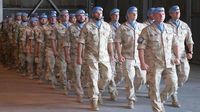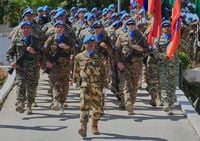The United Nations is bracing for one of the most significant shake-ups in its peacekeeping history, as sweeping U.S. funding cuts force the organization to withdraw thousands of troops and police from conflict zones worldwide. The announcement, delivered by a senior U.N. official on October 8, 2025, signals a 25 percent reduction in peacekeeping forces—meaning that between 13,000 and 14,000 military and police personnel will be repatriated in the coming months. The ripple effects of this decision will be felt from the Democratic Republic of Congo to South Sudan, Lebanon, the Central African Republic, Kosovo, and beyond.
According to VOVWORLD, the cuts stem directly from Washington’s decision to slash its contributions to the U.N. peacekeeping budget, a move aligned with President Donald Trump’s renewed “America First” doctrine. The U.S. had been expected to provide $1.3 billion of the $5.4 billion peacekeeping budget for 2025–2026. Instead, it will contribute only $680 million, less than half the planned amount. This leaves the U.N. facing a projected shortfall of 16 to 17 percent in its peacekeeping budget, with the overall budget trimmed by about 15 percent this year alone.
The scale of the reduction is staggering. As reported by BBC and other outlets, these cuts will affect not just military and police personnel, but also a large number of civilian staff, as well as their equipment. The organization’s support office in Somalia will also face significant downsizing. Missions in at least nine countries—including the Democratic Republic of Congo, South Sudan, the Central African Republic, Lebanon, Cyprus, Kosovo, and regions such as Western Sahara—will see their peacekeeping presence diminished.
The U.N. Secretary-General, Antonio Guterres, has long championed peacekeeping as a vital and cost-effective tool for global stability. In earlier remarks, Guterres emphasized, “With a budget representing a tiny fraction of global military spending, around one half of one percent, U.N. peacekeeping remains one of the most effective tools to build international peace and security.” But the current funding crisis, exacerbated by the U.S. retrenchment, has forced his hand.
“We have to cut out all of this other nonsense,” said Mike Waltz, the U.S. ambassador to the U.N., in a recent television interview, as cited by multiple sources including the Associated Press. Waltz reiterated the Trump administration’s view that the U.N. has become “bloated and redundant,” and that the U.S. wants to refocus the organization “on the basics of promoting peace, enforcing peace, preventing wars.” He added, “We want the U.N. to get back to basics.”
The U.S. and China together account for nearly half of the U.N.’s peacekeeping budget. In the wake of the American cuts, a separate U.N. official confirmed that China has pledged to pay its full share by the end of 2025—a gesture that may help cushion some of the blow, but not all. More than 60 U.N. agencies are now preparing to reduce staff by up to 20 percent, part of a broader reform plan and a direct response to shrinking U.S. contributions.
This is not the first time the U.N. has faced funding challenges, but the scale and timing of these reductions are unprecedented. U.N. peacekeeping operations have expanded dramatically since the early 1990s, when just 11,000 troops were deployed. By 2014, that number had soared to 130,000 across 16 missions. Today, about 52,000 men and women serve in 11 conflict zones across Africa, Asia, Europe, and the Middle East. The sudden loss of nearly a quarter of that force will inevitably alter the organization’s operational reach.
The impact will be especially acute in places where U.N. troops have been a lifeline for civilians. As diplomats warn, the missions in Congo and South Sudan—where peacekeepers have played a critical role in deterring violence and protecting vulnerable populations—are expected to face the sharpest reductions. The U.N. support office in Somalia, essential for logistical and humanitarian support, is also on the chopping block.
Humanitarian groups and U.N. insiders alike have raised alarms about the broader consequences. According to VOVWORLD, there is growing concern that the cuts will severely impact humanitarian operations, including aid convoys and support for civilians who rely heavily on international assistance. The possibility of reduced protection for civilians, fewer patrols, and diminished support for fragile peace processes looms large.
Behind the numbers lies a deeper debate about the future of multilateralism in a divided world. Since his return to office, President Trump has moved aggressively to scale back U.S. participation in global institutions, suspending membership in UNESCO, the World Health Organization, and the U.N. Human Rights Council, as well as reviewing contributions to a host of other agencies. The peacekeeping cuts are just the latest manifestation of this broader shift.
For the U.N., the challenge is not just financial but existential. As the organization prepares to send thousands of peacekeepers home, Secretary-General Guterres and his team are scrambling to reform and streamline operations, hoping to preserve the core mission of promoting peace and security. But with more than 60 U.N. offices and programs facing layoffs, the future of international peace efforts hangs in the balance.
Some observers see an opportunity in crisis. The U.S. has argued that the cuts will force the U.N. to become more efficient and focused, eliminating what it sees as unnecessary bureaucracy. Waltz and other U.S. officials have insisted that Washington will not consider restoring funding until a full review of every U.N. agency and program is completed. “We want to make sure American taxpayer dollars are spent wisely,” Waltz said.
Others, however, worry that the loss of personnel, expertise, and on-the-ground presence could embolden armed groups, destabilize fragile regions, and leave civilians exposed to greater risk. “The U.N. is at a crossroads,” said one senior official, speaking on condition of anonymity. “We are being asked to do more with less, at a time when the world is facing more crises, not fewer.”
China’s pledge to meet its full peacekeeping contribution by year’s end offers a glimmer of hope, but it remains to be seen whether other countries will step up to fill the gap left by the U.S. In the meantime, the U.N. is moving ahead with its drawdown plans, preparing for a leaner, more focused peacekeeping presence in some of the world’s most volatile hotspots.
The coming months will test the organization’s ability to adapt and endure. As the U.N. scales down operations, diplomats, peacekeepers, and civilians alike are left to wonder what the future holds—and whether the world’s premier institution for peace can weather this storm.


